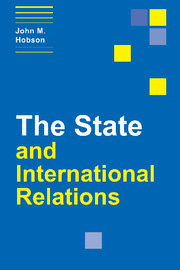Book contents
- Frontmatter
- Contents
- List of figures
- Acknowledgements
- 1 What's at stake in the ‘second state debate’? Concepts and issues
- Part 1 Traditional theories of the state and international relations
- Part 2 Recent sociological theories of the state and international relations
- 4 Marxism
- 5 Constructivism
- 6 Weberian historical sociology
- Part 3 Conclusion: proposing a ‘structurationist’ theory of the ‘constitutive’ state and global politics
- References
- Index
4 - Marxism
Published online by Cambridge University Press: 31 March 2010
- Frontmatter
- Contents
- List of figures
- Acknowledgements
- 1 What's at stake in the ‘second state debate’? Concepts and issues
- Part 1 Traditional theories of the state and international relations
- Part 2 Recent sociological theories of the state and international relations
- 4 Marxism
- 5 Constructivism
- 6 Weberian historical sociology
- Part 3 Conclusion: proposing a ‘structurationist’ theory of the ‘constitutive’ state and global politics
- References
- Index
Summary
Introduction
Though Marxism is clearly not a ‘recent’ theory, it has only recently been integrated into IR theory (though mainly within IPE). Like its realist and liberal counterparts, Marxism is far from a monolithic body of thought, and embodies a wide number of variants. Nevertheless, with respect to the state's agential power (see pp. 5–8 for full definitions) I suggest that there are three broad positions in the Marxist theory of the state:
(1) a theory of low domestic agential state power but moderate international agential state power found in classical Marxism
(2) a theory of moderate domestic agential state power and moderate international agential state power, also found in parts of classical Marxism but most especially in ‘orthodox’ neo-Marxism
(3) a theory of low-moderate domestic agential state power but no international agential state power, found in world systems theory (WST).
Classical Marxism
Marxists often argue that Karl Marx never developed a finished theory of the state – a task that was supposedly reserved for his projected sixth volume of Capital. The prominent neo-Marxist state theorist Bob Jessop even goes so far as arguing that the construction of a ‘finished’ Marxist theory of the state is not even possible (Jessop 1984: 29, 211–13). However, Marx did succeed in formulating a theory of the state, even though at times it was ambiguous and, arguably, it would be surprising if his projected sixth volume would have added much more to what he had already produced in his extensive writings between 1843 and his death in 1883.
- Type
- Chapter
- Information
- The State and International Relations , pp. 109 - 144Publisher: Cambridge University PressPrint publication year: 2000

